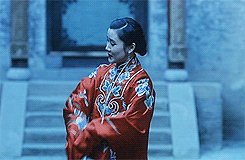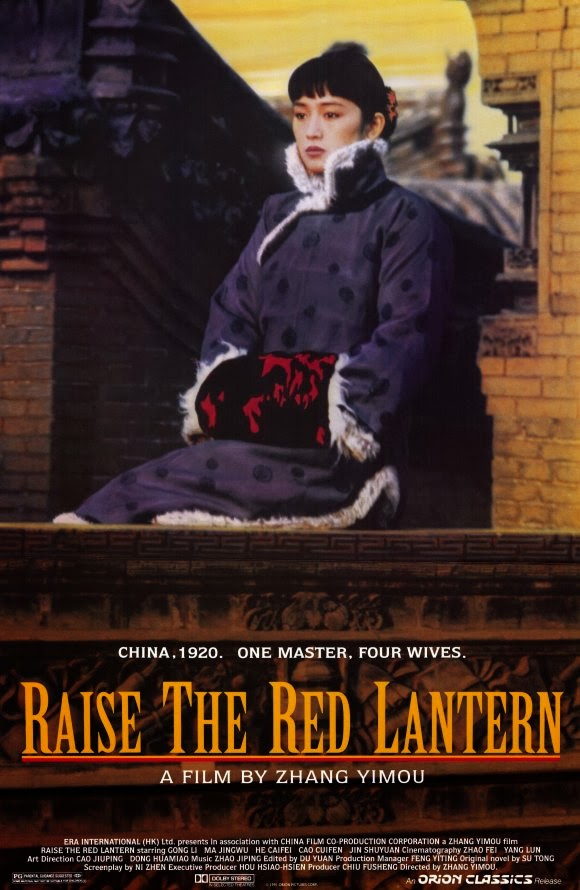Raise the Red Lantern (1991)
Zhang Yimou is by far my favorite Chinese director. Even though he seems to be losing steam since Hero (2002) IMHO, he has never lost his eye for creating beautiful shots, be it with modest budgets (Ju Dou -- 1990) or huge ones (Curse of the Golden Flower -- 2006). Raise the Red Lantern, however, stands tall as his (and Zhao Fei's, its cinematographer) crowning achievement. I don't remember ever having watched a movie so visually stunning and yet so devastatingly sad.
Raise the Red Lantern chronicles a year in the life of Songlian (Gong Li), who, at the age of 19, was compelled into marrying a rich man. Her new world is, thus, comprised of the labyrinthine estate she shares with her husband and his three other wives, each one with a house of his/her own. Every day, the Master chooses one of his wives to spend the night with, and the chosen mistress has red lanterns lit in front of her house, gets a foot massage and has the privilege of selecting the following day's menu, one of the many generations-old family rituals. One unhappy day follows another, with the women competing against each other for the Master's attention. In her 20th birthday, terribly sad for being the indirect cause of the death of one of her servants, Songlian gets drunk to momentarily forget her woes, and accidentally tells the Second Mistress about the affair the Third Mistress, Songlian's only friend, is having with the family doctor. The Second Mistress then happily passes those news on to the Master of the house, who has the Third Mistress killed. Dreadfully remorseful for being the cause of yet another death, and seeing no hope in her bleak life, Songlian finds her ultimate refuge in madness.
 |
| The four mistresses having their first lunch together |
It's quite interesting to see how the personalities of the four mistresses are reflected in their respective houses. The First Mistress, Yuru (Shuyuan Jin), is the oldest of them all and, because of that, no longer of interest to the man she belongs to, the Master of the house (Jingwu Ma). Also, she has already given him a son, thus "fulfilling" her purpose in life. Because of that, her house is very austere, stark even, with only a praying altar as a significant piece of furniture. Perhaps she is making amends to her ancestors as she waits for the inevitable? As a matter of fact, she is never called by name or even acknowledged by the Master in the whole duration of the movie...
Also sharing the estate is the Second Mistress, Zhuoyan (Cuifen Cao), described as "having a Buddha's face and a scorpion's heart". By having an envious nature and only having been able to bear a "worthless daughter", I believe she must be trying to emulate the First Mistress' house, while also decorating it with hopeful red lanterns. Besides, as she herself is getting older, she was forced into scheming against the younger mistresses aiming at keeping the Master's favors. Therefore, by being afraid of being plotted against, she has a mirror placed across her front door in order to protect herself (a typical practice in Chinese Feng Shui).
 |
| The Third Mistress, Meishan (Saifei He) singing to herself |
The Third Mistress, Meishan (Saifei He), was seemingly forced into quitting her prominent career as a Chinese Opera singer in order to marry. Because of that, and also because she is the only woman actually (albeit secretly) happy in the movie, her house resembles a joyful Peking Opera stage.
At last, since the Fourth Mistress (Gong Li) is too miserable to decorate her house herself, that task was hence delegated to the main servants of the house, who probably have filled her walls with Confucius's words of wisdom such as 三从四德, roughly translated as "the three obediences": a woman must obey her father prior to marriage, her husband during marriage and her son after marriage. The most significant addition to her apartments, though, comes later on in the movie, when she has her red lanterns covered in black cloth by the Master's orders after having her fake pregnancy discovered: there could never have been a more symbolic way of representing her hope toward her future being thwarted by the patriarchal Chinese society.
|
|
||||
|
|
Talking about Gong Li, well, she's had a rough time onscreen in the hands of Zhang Yimou. Except for The Story of Qiu Ju (1993 - a remarkable display of the contrast between the countryside and the city life in China) and To Live (1994, a beautiful counterpoint to Chen Kaige's excellent Farewell My Concubine, 1993), all characters played by Li for Yimou were awfully miserable in their love lives. In here, as in Red Sorghum (1989) and Ju Dou (1991), she is forced to marry an older man, not a leprous, as in the former, nor a sadist, as in the latter, but to a nameless entity who treats his wives as "robes", as Songlian gets off her chest:
I'm just one of the Master's robes. He can wear it or he can take it off.
( As an interesting parallel, Wong Kar-Wai (one of my favorite Hong Kong directors) used a similar approach, that of treating some key characters as entities, focusing on the impact their actions and decisions have on the main characters, in his stunning In the Mood For Love (2000). )
 |
| The Fourth Mistress, Songlian (Gong Li) receiving a foot massage |
In both Red Sorghum (1989) and Ju Dou (1991), Gong Li's characters find love in infidelity: in the former, that love originates from desire; in the latter, it springs from kindness (also from the lack of choice, as her lover was the only other man she'd ever spend time with after marriage). In here, she's also desperate for love and, again partially due to the lack of choice, she makes subtle advances on the Master's eldest son (topic explored by Yimou in his Curse of the Golden Flower -- 2006), perhaps looking for the same kind of happiness Meishan has found with the doctor? Speaking of which, Saifei He is great as Meishan, playing a role within a role, as she herself puts it:
Good or bad, it's all playacting. If you play well, you fool the others. If you play badly,you can only fool yourself. If you can't even fool yourself, you can fool the ghosts.
There's something of otherworldly beautiful whenever Meishan is depicted singing Chinese operas by herself, partially due to her exquisite voice, partially thanks to the excellent visuals created by Yimou and his cinematographer.
Incidentally, the cinematography and the production design in Raise the Red Lantern are spectacles all by themselves, as is usual in most of Yimou's movies. Perhaps exploiting the limitations imposed by the three-strip Technicolor process, which provided vibrant colors at the expense of subtle tone variations, each one of his movies seems to highlight two particular colors in their ensemble. Red Sorghum (1989), for example, gives great focus to the colors yellow and red (red, specially, in its beautiful - yet dreadful - closing scene); Ju Dou (1991) and Shanghai Triad (1996), on the other hand, seem to emphasize a color pallet saturated on yellow during the day and on blue during the night, creating thus an ethereal look for those films, reinforcing the nightmarish quality of their stories. Even in To Live (1994), depicting the birth of Mao's monochromatic China from the point of view of a poor couple, Yimou made sure there was a bright red element framed every now and then, a technique similar to that used by Bruno Delbonnel in Amelie (2001). In Raise the Red Lantern, he seems to focus in the contrast between the red of the lanterns and garments and the gray (or white, during winter) of the mansion. The resulting shots are so astonishingly beautiful I could not decide on just one (our four) frame to end this post with... By the way, Yimou's color-highlighting characteristic also stands in his non-Technicolor movies, such as Hero (2002), with shots comprised basically of tone variations of the same color, depending on the state of mind of the characters, and Curse of the Golden Flower (2006), with its opulent tones of yellow and pink.
Summarizing it:
| Liked | Didn't like |
|---|---|
| Gong Li, fantastic as usual | I wish it were longer. Don't get me wrong: it's a 2h movie, but I wish I knew more about the lives of the three other concubines (specially the First Mistress, to whom is given very little screen time). |
| Brilliant cinematography and production design, made even better by the use of Technicolor |
The final line of the opening scene, foreboding and gloomy:
Great Movie review by Roger Ebert here.
If you liked this movie, then maybe try watching Chen Kaige's Farewell My Concubine (1993), and Wong Kar-Wai's In the Mood for Love (2000).








Comments
Post a Comment